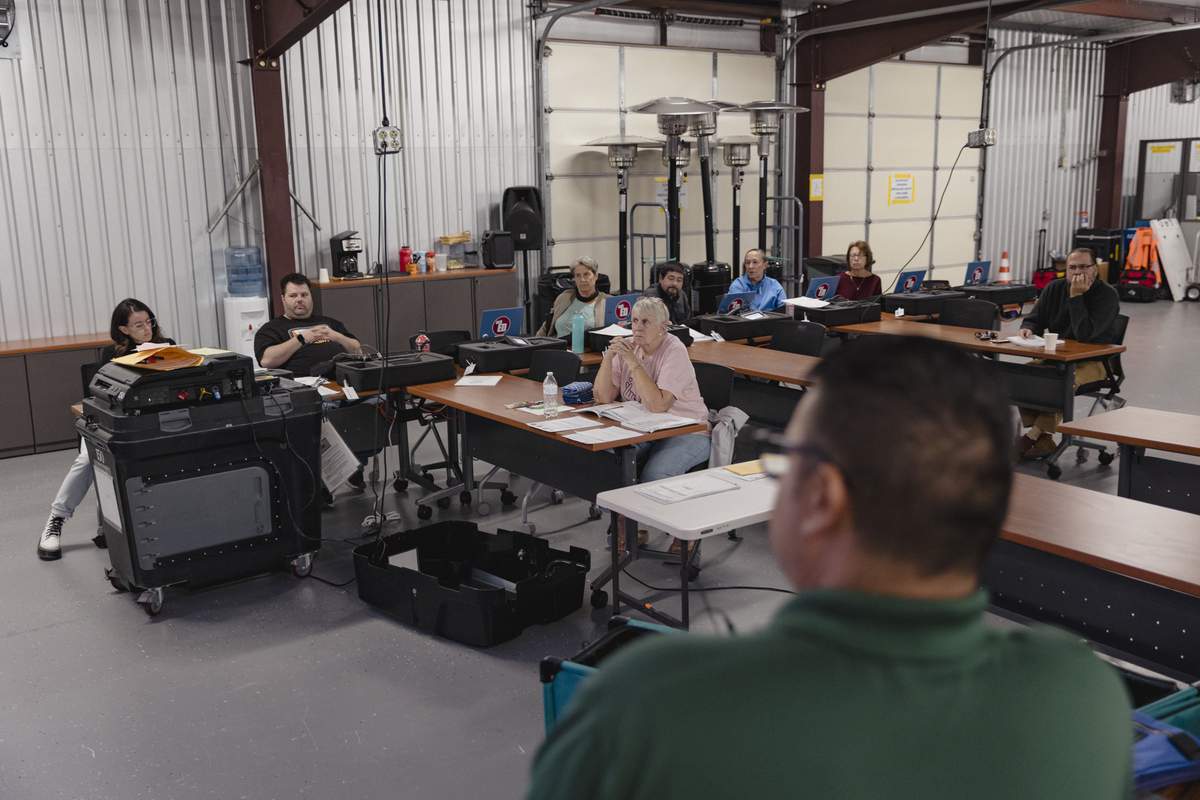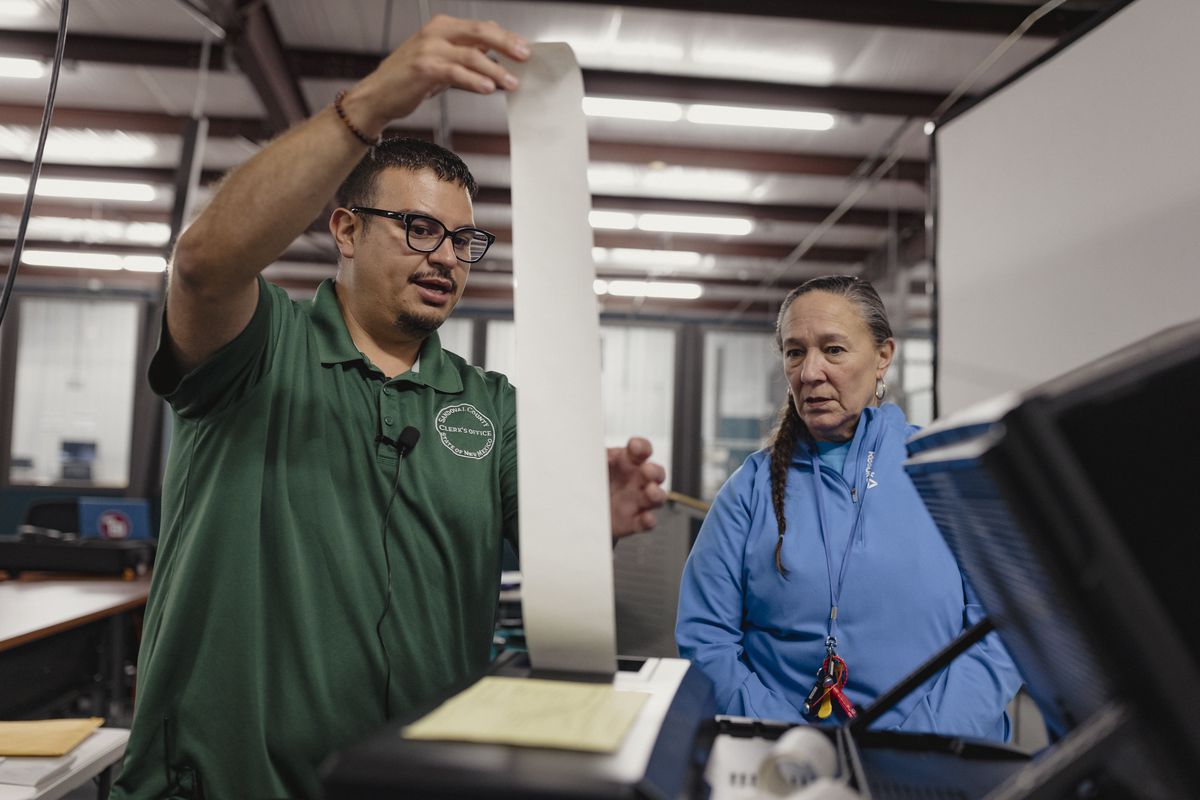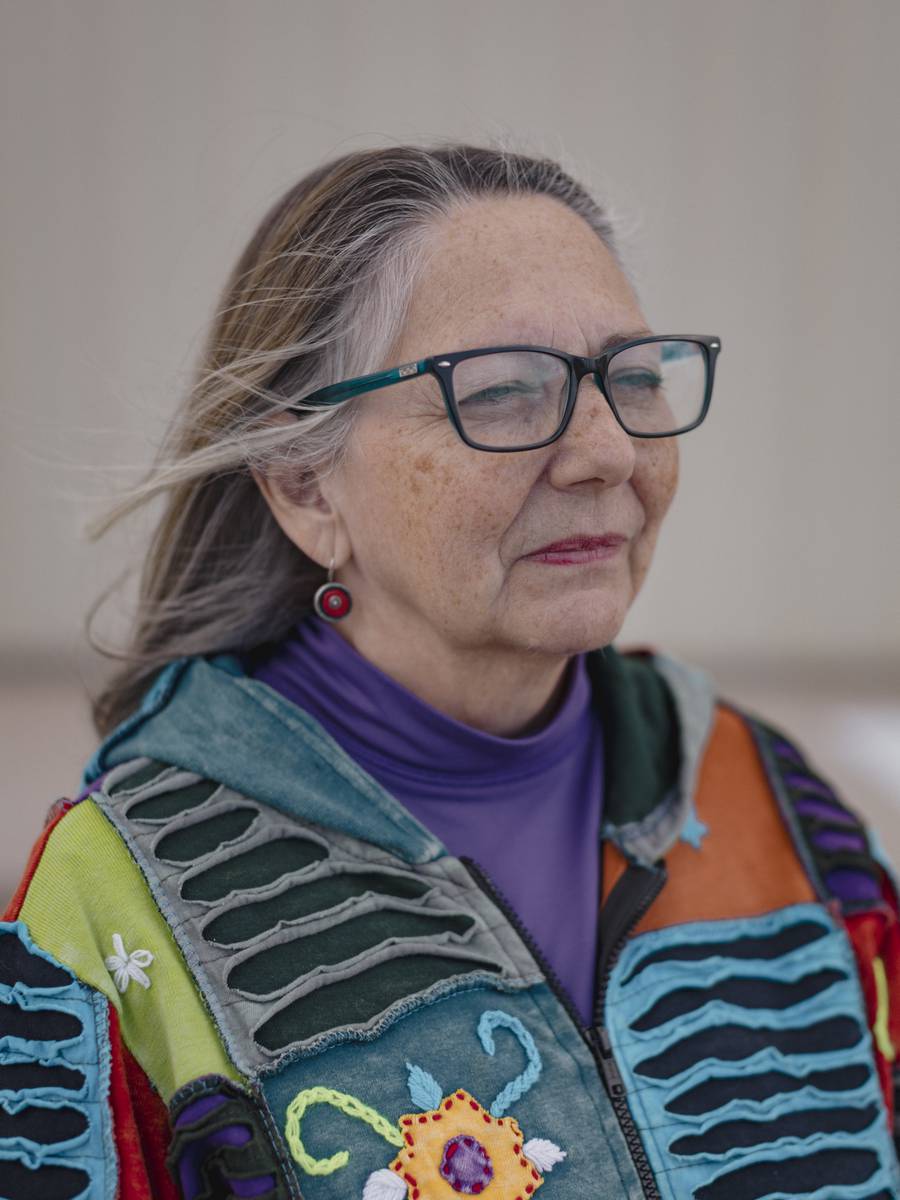

Left: Election workers attend a training session at the Sandoval County Clerk’s warehouse.
Right: Sandoval County Chief Deputy Clerk Joey Dominguez trains poll workers at the warehouse in Bernalillo, New Mexico.
16:33 JST, November 4, 2024
BERNALILLO, N.M. – Joey Dominguez stood in a warehouse on the dusty western flank of Interstate 25, speaking over the whine of fans set into the building’s corrugated wall panels. His audience, the last 10 among more than 400 volunteers Dominguez had trained to work the upcoming election, listened as he discouraged them from talking about politics at the polls.
“Perception in elections,” Dominguez said, “is everything.”

Sandoval County Clerk Anne Brady-Romero has led a sometimes controversial outreach effort to her critics.
It was an apt credo for Dominguez, the chief deputy clerk of Sandoval County, New Mexico. His boss, County Clerk Anne Brady-Romero, a Democrat, has led a bold and at times controversial effort to win over outspoken promoters of doubts about the state’s voting process.
That hasn’t been easy in New Mexico, where conspiracy theories about ballot manipulation flourished in the years after former president Donald Trump lost the 2020 election. But so far, it appears to be paying dividends in Sandoval County, a politically and demographically mixed collection of booming suburbs, Indigenous communities and federal park land that sprawls over 3,700 square miles north of Albuquerque.
Sandoval was one of two New Mexico counties in which at least one commissioner refused to certify the vote during the 2022 midterms, citing concerns about how elections were conducted. Two years later, that commissioner – Jay Block, a Republican – says he and other local GOP officials have confidence in Brady-Romero’s work. They credit their clerk for a conciliatory approach that, combined with efforts to address Republican concerns about ballot security, has helped cool arguments that reached a fever pitch two years ago.

County Commissioner Jay Block, who opposed certifying elections in 2022, says he is now “very happy” with the clerk’s work.
“We’ve all been very happy with what we’ve seen so far,” Block said. “The clerk has been very open and transparent.”
Sandoval County has overhauled the hand-counting of absentee ballots, reduced its number of ballot drop boxes and curtailed their hours of access. Not only have Brady-Romero and Dominguez, her chief deputy, spent many hours answering questions from a local activist group that has promoted debunked allegations of widespread voter fraud; they have hired two of the group’s leaders to work the polls on Tuesday.
“When I’m here in this office, I’m not a Democrat and I’m not a Republican. I’m just a public servant,” Brady-Romero said. “And I include the public to come and learn, especially with all the misinformation that’s out there.”
The détente in Sandoval mirrors a statewide trend at odds with developments elsewhere in the country. As machetes are brandished at Florida polling sites and ballot drop boxes in the Pacific Northwest go up in flames, in New Mexico – once a hotbed of right-wing antagonism toward the local and state officials who oversee voting – something remarkable is happening: a calm election.
More than half a million people have cast early or absentee ballots without incident, according to the New Mexico secretary of state’s office. In Otero County, where commissioners also voted to block certification of an election two years ago, Republican officials say voting is now proceeding smoothly.

Sandoval County Commissioner Katherine Bruch worries that some election changes have limited voters’ access.
With the election days away, state and local officials are watching and waiting to see whether the relatively peaceful atmosphere can last. And in Sandoval County, where a record-breaking 62,000 voters had cast early and absentee ballots by Saturday evening, Brady-Romero will learn whether her own experiment in radical transparency has truly defanged the years-long campaign to sow misinformation among her constituents.
Some of her fellow Democrats are skeptical.
Sandoval County Commissioner Katherine Bruch said she fears some of the county’s actions have unfairly limited voting access. And while she praised Brady-Romero and her staff for their outreach, she said it might not matter if Trump again loses the election and seeks to stoke false claims about widespread fraud. President Joe Biden won the county by 8 points in 2020.
The clerk’s overture to right-wing activists “has paid off” by allaying tensions ahead of the election, said Bruch, a Democrat. “That doesn’t mean they’re not going to be right back there saying something is wrong if it doesn’t go the way they want.”
An unlikely hotbed
New Mexico may seem an unlikely hotbed for claims of stolen elections. Democrats control all three branches of state government and have won the state’s five electoral college votes in all but one of the last eight presidential elections. (George W. Bush carried New Mexico in 2004.)
Biden defeated Trump by nearly 11 points in New Mexico in 2020, but his comfortable margin didn’t prevent the “Stop the Steal” movement from taking root. The state was one of seven where Republicans submitted fraudulent slates of electors.
In June 2022, Otero County commissioners voted not to certify the results of their primary election, citing suspicion of Dominion voting machines. Two reversed course when threatened with a court order from Secretary of State Maggie Toulouse Oliver, a Democrat. The third, a cowboy pastor named Couy Griffin, refused to change his vote but was soon removed from office by a state court because of his involvement in the riot at the U.S. Capitol on Jan. 6, 2021. Griffin was not charged with any acts of violence but was found guilty of entering restricted grounds outside the Capitol, a misdemeanor.
In Sandoval County, the majority-Republican commission certified the primary – except for Block, who had just lost his race for the GOP gubernatorial nomination. He cast the lone dissenting vote, saying officials had not properly handled the transportation of ballots.
The meeting was a raucous one, as the commissioners, clerk and her staff were loudly jeered by an angry crowd of activists.
“We were going to be in a really bad place,” Bruch said, “if things continued to spiral out of control.”
Enter Brady-Romero, a former chief deputy in the clerk’s office who had won office in 2020 as allegations of rigged voting began to catch fire. Brady-Romero’s family has firsthand experience with the hazards of public service in New Mexico: Her great-grandfather was Lincoln County Sheriff William J. Brady, she said, a 19th-century lawman murdered by Billy the Kid.
From the outset, Brady-Romero was not averse to suggestions for improving ballot security, which figured prominently among the demands of election skeptics. She had worked for years on a surveillance team in a nearby tribal casino, and one of her first official actions was to install cameras in the Bernalillo warehouse where ballots are stored and counted. She also set up a Plexiglas barrier around the previously unsecured area where absentee ballots are processed – simultaneously satisfying demands for safety and transparency.
She has also reduced the county’s ballot drop boxes to just three locations, down from seven, and also closed them overnight. Brady-Romero said she would prefer to have more drop-off locations but that her staff is stretched too thin to monitor additional sites.
Yet it is in the less tangible aspects of election administration that the Sandoval clerk’s office has arguably made the biggest impression.
John Veltri, a Placitas resident who leads the New Mexico Election Transparency Network – an organization that has been at the forefront of efforts to cast doubt on the reliability of local voting procedures – said he still worries that elections are vulnerable to fraud or manipulation. He believes voters should be required to present identification at the polls and that the county should ditch its voting machines in favor of hand-counting ballots.
However, he said he gives the clerk and her staff credit for their seemingly endless patience with his questions and concerns.
During a presentation the clerk’s office held for those suspicious of its methods, Veltri was allowed to personally inspect a Dominion tabulator. (“That was awesome,” he recalled.) Dominguez picks up the phone even for somewhat outlandish inquiries – as when Veltri recently asked the chief deputy to find out what would happen if Kamala Harris were suddenly replaced as the Democrats’ presidential nominee.
Brady-Romero “has come a long way. Definitely in the last six months or more, I’ve seen some huge steps,” Veltri said. “She’s tried to make things easier for the public to understand.”
Both Veltri and Ramona Goolsby, his organization’s librarian, have signed up as official poll workers for the upcoming election. Despite their ongoing broadsides against the state’s voting methods, they have signed a code of conduct, which states that “poll workers should, at all times, uphold and increase the public trust and confidence in New Mexico elections.”
Goolsby said she sees no conflict in the dual roles, and that their group’s criticisms are aimed at increasing the public’s faith in voting by holding election officials accountable.
‘It made it worse’
About 240 miles south on I-25, Doña Ana County Clerk Amanda López Askin said that while she supports efforts like those of Brady-Romero and Dominguez, she has learned through hard experience that some of her doubters can’t be reasoned with. López Askin assumed office in 2018 and immediately found herself in the sights of Yvette Herrell, a Republican candidate for New Mexico’s 2nd Congressional District who alleged without evidence that the election was stolen through fraud.
At the outset, López Askin, a Democrat, believed critics simply needed to better understand the process.
“That’s what I thought: I’ll engage, I’ll show them, and then it will be good. It just didn’t work,” she said. “It made it worse. It just gave them ammunition.”
In 2021, López Askin declined an invitation to address a Las Cruces activist group that had promoted a report claiming widespread election fraud in New Mexico. Last week, she fired a poll worker who appeared to suggest on a right-wing social media site that he planned to secretly make video recordings on Election Day.
She said she worries that any goodwill that Brady-Romero and Dominguez have curried among their detractors could evaporate on Tuesday if national Republicans raise an outcry about election theft.
Last week Trump and his running mate, Sen. JD Vance (R-Ohio), stepped up their amplification of false or unproven voter fraud allegations in Pennsylvania. New Mexico has received less attention, although Trump falsely claimed at a rally in Albuquerque on Thursday that he had won the state in both 2016 and 2020.
Like their counterparts in other states, Brady-Romero and Dominguez have prepared for possible threats from extremists. Sandoval County’s public safety agencies have a coordinated plan for handling disruptions at the polls. Sheriff’s deputies will escort clerk’s officials who transport ballots from remote polling sites on Election Day.
Yet, alongside such signs of a nation still plagued by profound distrust of its own democratic systems, Sandoval County also shows signs of progress.
Nancy Jinks, a retired state employee who lives in the conservative-leaning city of Rio Rancho, said she grew concerned about “manipulation” of ballots after the 2020 election. Jinks, a Republican, became an election observer, seeking to ferret out irregularities in the counting of ballots. She got to know Dominguez, who joked that if she wanted to spend so much time in the clerk’s warehouse she might as well become a poll worker.
That is what Jinks did. On a recent afternoon, she left the enclosed area where she had been among roughly two-dozen people processing absentee ballots. Jinks said she still suspects that someone at the state level could be tampering with people’s votes, but she is convinced the problem is not in Sandoval County.
“I don’t blame Anne and Joey – I think the world of them,” Jinks said. “I think it’s higher up that there’s a certain amount of manipulation.”
Along with Harris and Trump, Brady-Romero is actually on the ballot this year, running for a second term. Jinks said she voted early for her, party affiliation notwithstanding.
For the moment, at least, she’s reasonably sure her vote will be counted.
Top Articles in News Services
-

Survey Shows False Election Info Perceived as True
-

Hong Kong Ex-Publisher Jimmy Lai’s Sentence Raises International Outcry as China Defends It
-

Japan’s Nikkei Stock Average Touches 58,000 as Yen, Jgbs Rally on Election Fallout (UPDATE 1)
-

Japan’s Nikkei Stock Average Falls as US-Iran Tensions Unsettle Investors (UPDATE 1)
-

Trump Names Former Federal Reserve Governor Warsh as the Next Fed Chair, Replacing Powell
JN ACCESS RANKING
-

Producer Behind Pop Group XG Arrested for Cocaine Possession
-

Japan PM Takaichi’s Cabinet Resigns en Masse
-

Man Infected with Measles Reportedly Dined at Restaurant in Tokyo Station
-

Israeli Ambassador to Japan Speaks about Japan’s Role in the Reconstruction of Gaza
-

Videos Plagiarized, Reposted with False Subtitles Claiming ‘Ryukyu Belongs to China’; Anti-China False Information Also Posted in Japan























